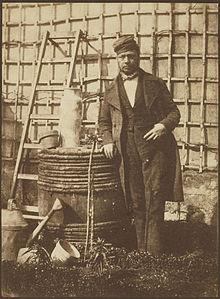This article includes a list of general references, but it lacks sufficient corresponding inline citations. (December 2018) |
Hippolyte Bayard | |
|---|---|
 Self portrait, salt print (1847) | |
| Born | 20 January 1801 Breteuil, Oise, France |
| Died | 14 May 1887 (aged 86) |
| Nationality | French |
| Known for | Photography |
| Notable work | Self Portrait as a Drowned Man |
Hippolyte Bayard (French pronunciation: [ipɔlit bajaʁ]; 20 January 1801 – 14 May 1887) was a French photographer and pioneer in the history of photography. He invented his own process that produced direct positive paper prints in the camera and presented the world's first public exhibition of photographs on 24 June 1839. He claimed to have invented photography earlier than Louis-Jacques Mandé Daguerre in France and William Henry Fox Talbot in England, the men traditionally credited with its invention.[1]
Bayard experimented with the new medium taking photos of plant specimens, statuary (including posing with them for self-portraits), street scenes, urban landscapes, architectural photos, and portraits. He photographed prominent figures and an ordinary worker. He also advocated combination printing and was one of the founders of a photo society.
- ^ "Hippolyte Bayard (French, 1801 - 1887) (Getty Museum)". The J. Paul Getty in Los Angeles. Archived from the original on 2013-10-24. Retrieved 2016-04-06.